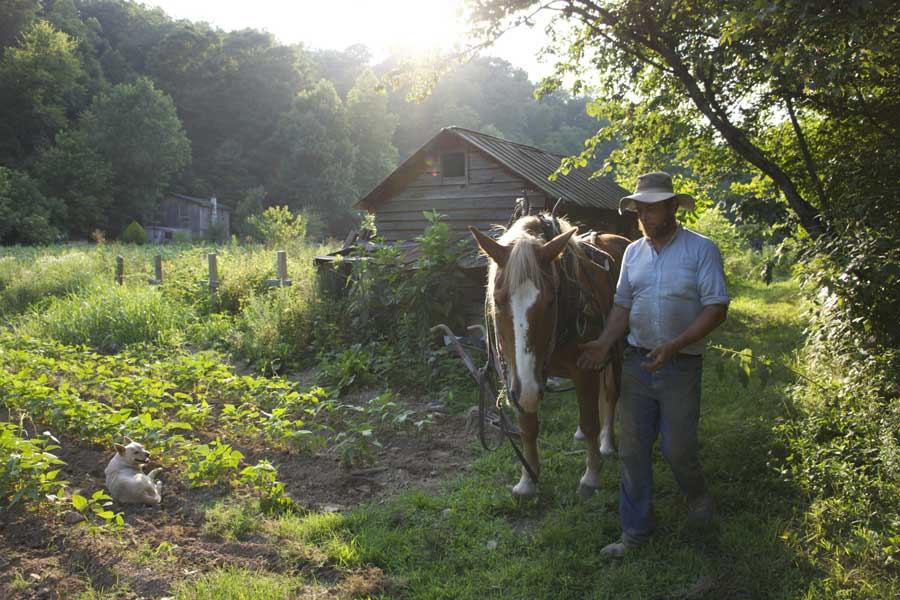WATCH IT ONLINE
Watch the documentary online here.
Callie T. Wiser likes the gray areas of a story. Always interested in history, she prefers to dig beyond just learning the dates and names related to historical events.
Even while being part of a film discussion group as a student at Baylor School, where she graduated in 1998, she was more interested in the back story to some of the classic films the group dissected.
"I like complicating and making people be human beings rather than characters in a history book," she says.
It is largely that part of her that led the Signal Mountain native to become a filmmaker and documentarian, including her latest, the documentary "Amish Shunned," which is airing on PBS stations nationwide. She currently lives and works in Massachusetts, where she has worked with the PBS series "Frontline" and for American Experience films.
"Amish Shunned," which she wrote, directed and produced, follows seven people who have chosen to leave their Amish family and community, knowing they will be completely cut off from that world once they leave and not allowed to return.
"The film is an emotional roller coaster through a set of universal experiences that anyone can understand, even if they're not Amish," said Mark Samels, executive producer of American Experience.
In the documentary, viewers are taken into a world of beautiful landscapes and horse-drawn buggies, and the harsh reality of what it means to sever ties with loved ones.
"It's the disobedient people who leave the Amish church," according to an unseen Amish man who's speaking in the documentary. "They wanted something that was not allowable. So they just moved on. If we're not obedient, we will fall by the wayside. But how can you be obedient when you don't have any rules? Some people don't understand our church rules, and they don't need to. It's not necessary that you people understand all the church rules that we have. That's our thing. When we lose obedience, we lose the church. Amen."
Prior to "Amish Shunned," Wiser worked as a producer along with director David Belton on "The Amish," another documentary series airing on PBS, and co-produced "George H. W. Bush" with Austin Hoyt. "Amish Shunned" is her first solo project under her newly formed Five O'Clock Films company. It took 15 months of research, interviews, filming and editing to get "Amish" completed and another 14 months on "Amish Shunned."
"So, for 29 months, I was full time working on these two films," she says.
Her desire to devote so much to them stemmed from her innate need to look into the gray areas. When the project began almost three years ago, she began doing some research on the Second Great Awakening, the Protestant movement of the late 1700s and early 1800s that was a reaction against skepticism, deism and rationalism. Wiser was fascinated by some of the paintings and drawings from the time.
"They had Methodist camp meetings; they had Baptist camp meetings; they had Amish camp meetings; they had Quaker camp meetings and, frankly, everybody looked pretty much alike. They may have had different hats, but everyone dressed alike," she says.
"I was fascinated by this idea that the Baptists and the Methodists had this same message that the Amish have now, which was: 'Come out of this world. Join our church. Leave the material world and enter our spiritual world.' And somehow, between then and now, the Amish retained that and [today] the Baptist and Methodist are much more mainstream.
"I was fascinated by how the Amish did that and part of the answer is shunning. You are in the Amish or you are out."
Wiser likes the fact that the longer-format documentary allows more of the story, with more voices and viewpoints, to be told. As a journalism and political science major at the University of North Carolina, Chapel Hill, she realized that you can't tell a full story in a 30- or 60-second soundbite. She was more interested in why someone did something than what they actually did.
"It left out a lot of the gray and, for me, what was interesting was what's in the gray," she says. "It's a lot more complicated."
"Amish Shunned" was inspired by "Amish," of course, and was an opportunity to tell more of the Amish story, she says. She originally thought she would be able to use footage shot for the first documentary in the second, but she found new material with each new interview.
"We spent a number of months reaching out to people to make new contacts to make sure we knew the diversity of the story," she says. "We knew there would be people who would never talk to us on recorder, so we tried to talk to those people in an informal setting and get their point of view. We knew some of the parents would never talk to us. That is why we used the letters. I loved the letter to Levi from his mother that starts out, 'Dear loved son Levi.' That is as much her voice as we could get, but you know she loves her son. She just wishes he was Amish."
In the documentary, Levi explains that he simply wanted a different life.
"I guess I always wanted to leave. I was dressing Amish, but I wasn't living up to the Amish rules and stuff, anyways," he says in "Amish Shunned." "For me, I wanted to experience a different life. I wanted to go out and drive a truck or something like that. I just thought that was - oh, that would be cool.
"Out here I have electricity, TV ... that was everything to us then, to have phones, radios and stuff like that. Of course our parents, they didn't like that. They would say it's worldly. It's against the rules. They always would end up finding it one time or another. You'd get careless with it and end up getting caught. My dad would either burn them or smash them up.
"I mean, I didn't understand all the rules, and I just - I didn't think - a lot of them didn't make sense. But then again, I had a pretty good life with my family."
As hard as it was to film and witness, Wiser says she understands why the Amish shun those who leave.
"The reason Amish people are able to shun is that they put the health of the community and the church above their individual wants. Yes, Levi's mother would want to reach out more than she does, but she knows that might hurt the church so she doesn't. It is hard for us on the outside to understand."


